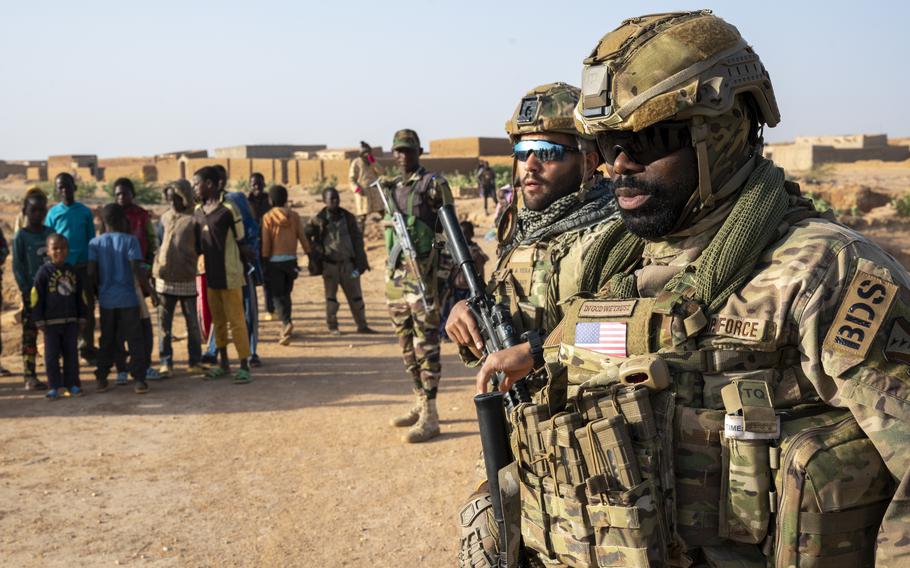
Air Force Staff Sgts. Yannick Adjei and David Vega, members of the 409th Expeditionary Security Forces Squadron, Quick Reaction Force, maintain security while conducting a joint patrol with the Niger Armed Forces on Jan. 6, 2023. (Michael Matkin/Air Force)
WASHINGTON — The U.S. military is drawing up plans for a potential withdrawal of its 1,100 troops from Niger, a counterterrorism ally in West Africa that is in the throes of a coup, the commander of U.S. air forces in Europe and Africa said Friday.
There are no immediate plans for military personnel to evacuate the country and abandon the two drone bases operated by U.S. forces in Niger’s northern desert, said Air Force Gen. James Hecker. But he said preparations are underway in case troops are ordered to leave.
“We’re going to play it out, we’re doing a lot of prudent planning,” Hecker said at a Defense Writers Group discussion with reporters. “But hopefully this thing gets done politically and diplomatically with no bloodshed.”
The military in Niger announced it had ousted the country’s president, Mohamed Bazoum, and seized power in late July. The U.S. has since ordered a pullout of many U.S. Embassy personnel in Niger, suspended drone and training flights, and constrained American troops to bases.
The U.S. first deployed troops to Niger in 2013, when 100 service members were sent to the country’s capital to help French forces set up unarmed surveillance drone operations to battle al-Qaida and its affiliates in Mali. The country is now a critical part of combating terrorism in the Sahel, a region of Africa where Islamist militancy has been on the rise.
In 2017, four American soldiers, their interpreter and four Nigerien soldiers were killed in a terrorist ambush in the deserts of Niger. But Niger remains a positive outlier in the region, seeing less militant attacks on civilians than its neighboring countries.
Fewer people were killed in Niger in the first six months of 2023 than in the first half of any year since 2018, according to the nonprofit Armed Conflict Location & Event Data Project.
Air Force Gen. James Hecker, commander of U.S. Air Forces in Europe and Africa, speaks March 8, 2023, at the Air and Space Forces Association 2023 Warfare Symposium in Aurora, Colo. (U.S. Air Force)
Hecker said an evacuation of American troops would “obviously” have an effect on the ability of the U.S. military to collect intelligence and conduct surveillance and reconnaissance in the Sahel. If forced to withdraw, the military would look to partner up with other allies in West Africa and move its assets, he said.
The Pentagon acknowledged Tuesday that the loss of access to Niger would be significant and difficult to replace.
“We will still be able to have capabilities within the region but Niger is a partner and we don't want to see that partnership go,” said Sabrina Singh, the Pentagon’s deputy press secretary. “We've invested hundreds of millions of dollars into bases there, trained with the military there.”
The U.S. military has two drone bases in Niger, including a $110 million airfield outside the city of Agadez, that would be left behind in an evacuation. Hecker said the U.S. would take “everything back with us” in case of a slow, peaceful withdrawal but would leave behind housing units and other non-sensitive equipment if forced to flee in a dangerous environment.
Hecker said it is difficult to say whether the bases could be used by others should the U.S. depart. Russia’s Wagner mercenary group swept into neighboring Mali last year after a coup there prompted French forces to end a nine-year antiterrorism mission.
The American base outside Agadez features a 6,200-foot runway for MQ-9 Reaper drones as well as manned aircraft. At least one other base is shared with a civilian airport, Hecker said. The U.S. has three drone bases in Niger, one of them operated by the CIA.
The U.S. has so far resisted designating the situation in Niger as a coup, which would trigger cuts in military assistance and other American aid. Hecker said Friday that he believes a decision on whether to withdraw is still weeks, if not months, away.
“Right now, there’s not a need to go anywhere,” he said. “Our civilian leadership is just saying, ‘Hey, hang tight and continue to plan in case something happens.’ And we’ll be ready if something happens.”